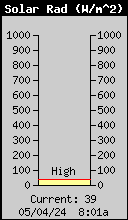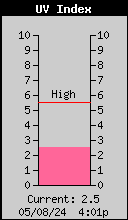SUN |
|
 |
 |
Solar Radiation
"Current Solar Radiation" is technically know as Global Solar Radiation, a measure of the intensity of the sun's radiation reacing a horizontal surface. The irradiance includes both the direct component from the sun and the reflected component from the rest of the sky. The solar radiation reading gives a measure of the amount of solar radiation hitting the solar radiation sensor at any given time, express in Watts/sq. m (W/m2).
UV Index
The UV Index is a forecast of the probable intensity of skin damaging ultraviolet radiation reaching the surface during the solar noon hour (11:30-12:30 local standard time or 12:30-13:30 local daylight time). The greater the UV Index is the greater the amount of skin damaging UV radiation.
How much UV radiation is needed to actually damage one's
skin is dependant on several factors. But in general the darker one's
skin is, (that is the more melanin one has in his/her skin) the longer
(or the more UV radiation) it takes to cause erythema (skin reddening).
Figure 1 shows a look up chart where by one can cross check his/her
propensity to burn versus the UV Index. For those who always burn and
never tan the times to burn are relatively short compared to those who
almost always tan.
The Environmental Protection Agency (EPA) has devised
general guidelines as far as what to do to protect oneself from overexposure
to UV radiation. These are shown in the table below.
| UV Index | Exposure Category | Protective Action |
| 0, 1, 2 | Minimal | Apply skin protection factor (SPF) 15 sun screen |
| 3, 4 | Low | SPF 15 and protective clothing (hat) |
| 5, 6 | Moderate | SPF 15, protective clothing, and UV-A & B sunglasses |
| 7, 8, 9 | High | SPF 15, protective clothing, sunglasses, and make attempt to avoid sun between 10 am and 4 pm |
| 10+ | Very High | SPF 15, protective clothing, sunglasses, and avoid sun between 10 am and 4 pm |
This weather data is provided for entertainment only. Never make important decisions based on information from this
weather page or any other weather site on the internet. © 2003 - 2023 Gary Leland Kerr. All rights reserved.
